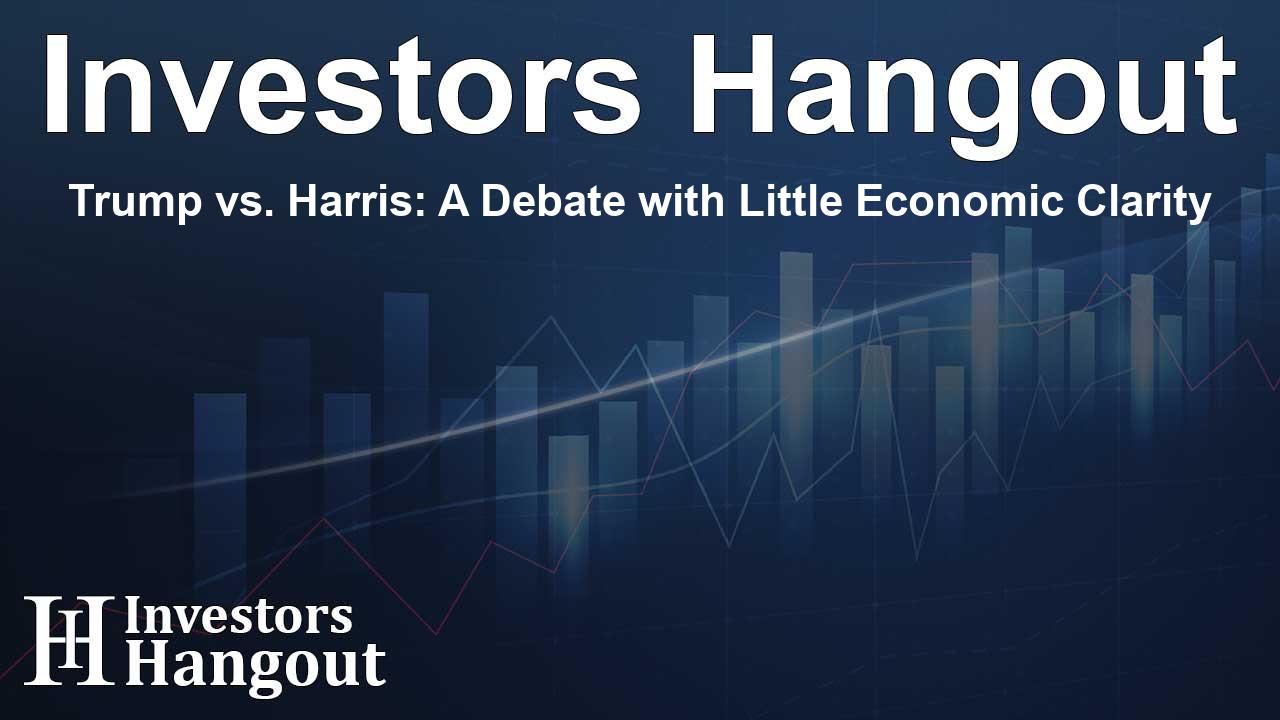Trump vs. Harris: A Debate with Little Economic Clarity

Trump and Harris Clash in High-Stakes Debate
The recent debate between Republican presidential candidate Donald Trump and Democratic contender Kamala Harris ignited a dynamic exchange of ideas, yet surprisingly few substantial policy details emerged. The debate was eagerly awaited, especially as both candidates appeared nearly equal in national polls.
Despite the heightened anticipation, investors found themselves with little clarity on crucial economic matters. When examining tariff policies, corporate taxation, and regulatory impacts, both candidates left a lot to be desired in terms of concrete proposals.
Economic Policies on Display
Throughout the campaign season, Trump has made bold promises to reduce corporate taxes and adopt a firmer approach regarding tariffs. Harris, on the other hand, has committed to increasing corporate tax rates. Economic analysts speculate that while the reduction proposed by Trump could potentially boost corporate profits, it may also lead to increased inflation. Conversely, Harris's approach could pose challenges to corporate profitability.
Tariff Debate: Trump vs. Harris
During the debate, Harris targeted Trump's stringent tariff policies, arguing that such measures would essentially lead to a tax burden on middle-class families. Trump countered by asserting that his tariffs wouldn't drive up costs for American consumers and emphasized Harris's role in the inflation trends seen during the Biden administration.
Market Reactions and Predictions
In the days following the debate, market speculation shifted slightly in favor of Harris, with predictions of an increased likelihood for her success in the election, moving from 53% to 56%, while Trump's chances dipped slightly from 52% to 48%.
Analyst Opinions
Feedback from analysts varied, with some highlighting the debate's lack of substantive economic discussions.
TD Cowen's Take
They observed, "This was not a debate tailored toward economic discourse. Key topics like the role of the White House in influencing interest rates or the effects of tariffs on inflation were glaringly absent."
BTIG's Perspectives
The BTIG analysts suggested that while Harris may have won favor with undecided voters, the debate likely reinforced existing partisan divides without altering them.
Wolfe Research Insights
Wolfe Research anticipated more extensive policy discussions but found the candidates reiterating previously established agendas instead. Notably, Trump maintained his strong focus on tariffs, which he emphasized early on.
Looking Ahead: The Stakes of the Election
Polling indicates undecided voters are eager for more information about Harris's policies before casting their support. Many expect Harris to be labeled as the debate's winner, yet the ongoing absence of distinct policy ideas may not satisfy voters' informational needs, suggest analysts.
Citi's Conjecture on Future Policies
Citi analysts noted that while the debate reiterated the importance of tariffs in Trump’s platform, market reactions showed a dip in yields despite Harris advocating more expansive fiscal policies during her presentations, indicating investor skepticism about the feasibility of her policies.
Frequently Asked Questions
What were the main topics discussed in the Trump-Harris debate?
The debate primarily covered economic topics, including tariffs, taxing corporations, and the broader implications of each candidate's economic policies.
How did the market react to the debate?
Following the debate, predictions slightly favored Harris over Trump, indicating a shift in market sentiments despite the lack of clear economic proposals from both sides.
What are Trump's economic proposals?
Trump has advocated for reducing corporate taxes and maintaining high tariffs on foreign goods as part of his approach to the economy.
What is Harris's stance on corporate taxes?
Harris plans to increase corporate taxes, contrasting with Trump's proposed tax cuts, positioning her policies as geared toward addressing economic inequalities.
What is the significance of tariffs in the debate?
Both candidates discussed tariffs but largely reiterated existing positions, with Trump framing them as beneficial while Harris portrayed them as a burden on the middle class.
About The Author
Contact Addison Perry privately here. Or send an email with ATTN: Addison Perry as the subject to contact@investorshangout.com.
About Investors Hangout
Investors Hangout is a leading online stock forum for financial discussion and learning, offering a wide range of free tools and resources. It draws in traders of all levels, who exchange market knowledge, investigate trading tactics, and keep an eye on industry developments in real time. Featuring financial articles, stock message boards, quotes, charts, company profiles, and live news updates. Through cooperative learning and a wealth of informational resources, it helps users from novices creating their first portfolios to experts honing their techniques. Join Investors Hangout today: https://investorshangout.com/
The content of this article is based on factual, publicly available information and does not represent legal, financial, or investment advice. Investors Hangout does not offer financial advice, and the author is not a licensed financial advisor. Consult a qualified advisor before making any financial or investment decisions based on this article. This article should not be considered advice to purchase, sell, or hold any securities or other investments. If any of the material provided here is inaccurate, please contact us for corrections.
